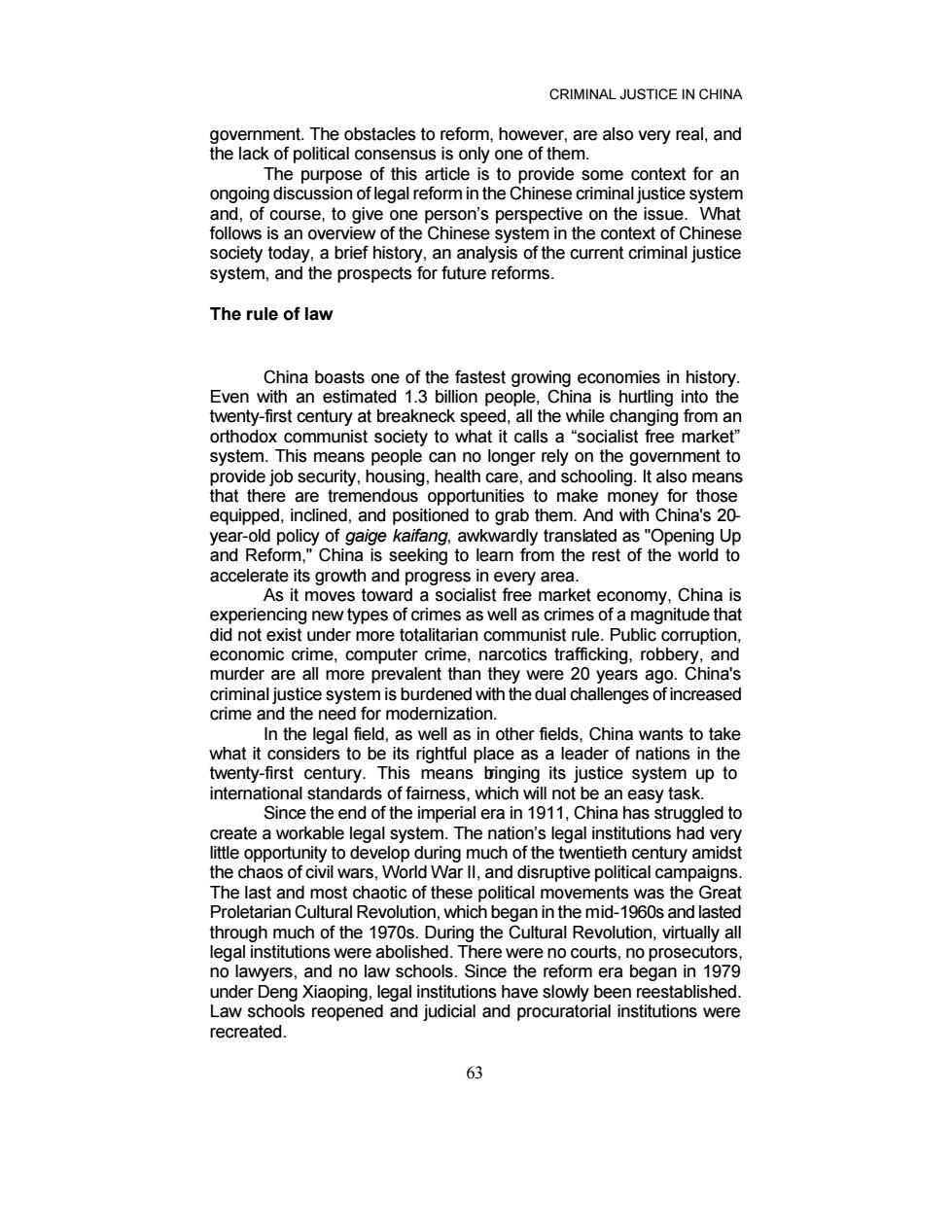正在加载图片...

CRIMINAL JUSTICE IN CHINA government.The obstacles to reform,however,are also very real,and the lack of political consensus is only one of them. The purpose of this article is to provide some context for an ongoing discussion of legal reform in the Chinese criminal justice system and,of course,to give one person's perspective on the issue.What follows is an overview of the Chinese system in the context of Chinese society today,a brief history,an analysis of the current criminal justice system,and the prospects for future reforms The rule of law China boasts one of the fastest growing economies in history. Even with an estimated 1.3 billion people,China is hurtling into the twenty-first century at breakneck speed,all the while changing from an orthodox communist society to what it calls a "socialist free market" system.This means people can no longer rely on the govemnment to provide job security,housing,health care,and schooling.It also means that there are tremendous opportunities to make money for those equipped,inclined,and positioned to grab them.And with China's 20 year-old policy of gaige kaifang,awkwardly translated as"Opening Up and Reform,"China is seeking to learn from the rest of the world to accelerate its growth and progress in every area. As it moves toward a socialist free market economy,China is experiencing new types of crimes as well as crimes of a magnitude that did not exist under more totalitarian communist rule.Public corruption, economic crime,computer crime,narcotics trafficking,robbery,and murder are all more prevalent than they were 20 years ago.China's criminal justice system is burdened with the dual challenges of increased crime and the need for modernization. In the legal field,as well as in other fields,China wants to take what it considers to be its rightful place as a leader of nations in the twenty-first century.This means binging its justice system up to international standards of fairness,which will not be an easy task. Since the end of the imperial era in 1911,China has struggled to create a workable legal system.The nation's legal institutions had very little opportunity to develop during much of the twentieth century amidst the chaos of civil wars,World War ll,and disruptive political campaigns. The last and most chaotic of these political movements was the Great Proletarian Cultural Revolution,which began in the mid-1960s and lasted through much of the 1970s.During the Cultural Revolution,virtually all legal institutions were abolished.There were no courts,no prosecutors, no lawyers,and no law schools.Since the reform era began in 1979 under Deng Xiaoping,legal institutions have slowly been reestablished. Law schools reopened and judicial and procuratorial institutions were recreated. 63CRIMINAL JUSTICE IN CHINA 63 government. The obstacles to reform, however, are also very real, and the lack of political consensus is only one of them. The purpose of this article is to provide some context for an ongoing discussion of legal reform in the Chinese criminal justice system and, of course, to give one person’s perspective on the issue. What follows is an overview of the Chinese system in the context of Chinese society today, a brief history, an analysis of the current criminal justice system, and the prospects for future reforms. The rule of law China boasts one of the fastest growing economies in history. Even with an estimated 1.3 billion people, China is hurtling into the twenty-first century at breakneck speed, all the while changing from an orthodox communist society to what it calls a “socialist free market” system. This means people can no longer rely on the government to provide job security, housing, health care, and schooling. It also means that there are tremendous opportunities to make money for those equipped, inclined, and positioned to grab them. And with China's 20- year-old policy of gaige kaifang, awkwardly translated as "Opening Up and Reform," China is seeking to learn from the rest of the world to accelerate its growth and progress in every area. As it moves toward a socialist free market economy, China is experiencing new types of crimes as well as crimes of a magnitude that did not exist under more totalitarian communist rule. Public corruption, economic crime, computer crime, narcotics trafficking, robbery, and murder are all more prevalent than they were 20 years ago. China's criminal justice system is burdened with the dual challenges of increased crime and the need for modernization. In the legal field, as well as in other fields, China wants to take what it considers to be its rightful place as a leader of nations in the twenty-first century. This means bringing its justice system up to international standards of fairness, which will not be an easy task. Since the end of the imperial era in 1911, China has struggled to create a workable legal system. The nation’s legal institutions had very little opportunity to develop during much of the twentieth century amidst the chaos of civil wars, World War II, and disruptive political campaigns. The last and most chaotic of these political movements was the Great Proletarian Cultural Revolution, which began in the mid-1960s and lasted through much of the 1970s. During the Cultural Revolution, virtually all legal institutions were abolished. There were no courts, no prosecutors, no lawyers, and no law schools. Since the reform era began in 1979 under Deng Xiaoping, legal institutions have slowly been reestablished. Law schools reopened and judicial and procuratorial institutions were recreated